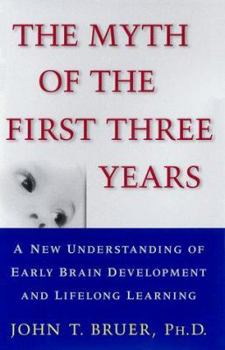Myth of the First Three Years: A New Understanding of Early Brain Development and Lifelong Learning
Select Format
Select Condition 
Book Overview
Most parents today have accepted the message that the first three years of a baby's life determine whether or not the child will grow into a successful, thinking person. But is this powerful warning... This description may be from another edition of this product.
Format:Hardcover
Language:English
ISBN:0684851849
ISBN13:9780684851846
Release Date:September 1999
Publisher:Free Press
Length:244 Pages
Weight:0.66 lbs.
Dimensions:1.0" x 6.4" x 9.6"
Customer Reviews
4 ratings
Very interesting and persuasive
Published by Thriftbooks.com User , 16 years ago
Falls into the category of: Things we all thought were true and based personal and government decision making on but were not really true or had none of the supporting evidence we all assumed.
A new perspective
Published by Thriftbooks.com User , 23 years ago
I'm going to start by disagreeing with a reviewer below. Dr. Bruer is not suggesting that we ignore our kids! Rather, his valuable book makes the simple point that neuroscience does not "prove" that the experiences of the first three years profoundly and irreversibly influence the remainder of life. It is true, Dr. Bruer points out, that abnormal and/or abusive environments do indeed damage kids. However, provided the child experiences normal care (a standard which varies greatly worldwide), he should develop normally. According to Dr. Bruer, There is no good nueroscientific evidence that "enriched" environments lead to better brain development. Dr. Bruer also points out that there may be good reason to believe that the brain remains plastic (changeable) throughout life. That's good news for those who came from less advantaged environments! It's also a relief for parents who for whatever reason could not give their children the good start they would have liked to give. This book is important to read for two reasons: first, it gives a good example of how science can be misinterpreted or even "created" in order to further a pre-set goal. Second, it sheds some light on a potentially dangerous effort to introduce super-early education programs for all children, disadvantaged or not. But I am holding back a star because Dr. Bruer fails to qualify his arguments with an important point. Even if the first three years do not of themselves determine the course of life, these are the years when habits are formed and the parent-child relationship is established. In other words, if we handle kids well and spend lots of time with them in years 1-3, we are much more apt to continue to do so in years 4-6, 7-9 etc. The kids will also have the good habit of enjoying their family life, and will, I believe, be much more open to parental influence. For this reason, parents need to take the day-care vs. in home-care decision much more seriously than Dr. Bruer implies. With that caution, I would recommend this book to parents, teachers and anyone interested in public policy.
Finally, a book with some science.
Published by Thriftbooks.com User , 23 years ago
After shelves upon shelves of books, magazines, and essays have been written about the brain science behind our childrens' developement, we finally have a book that actually discusses the evidence rather than shaping it for a particular goal. Mr. Bruer is not an advocacy group. He's not a political action committee. He has researched his book thoroughly, sourced it, and even interviewed the original scientists whose studies were horribly misinterpereted, misconstrued, or just plain misused. If you listen to the media, there are mountains of data regarding the connections between your baby's environment, and his/her brain developement. Mr. Bruer lets us hear from the scientists themselves that this is not true. They tell us that what little scientific evidence we have regarding such connections is incomplete, and should not be extrapolated to any practical parenting curriculum. In sum, we should raise our kids with common sense, love, and care. What a comfort that such a time-honored notion should still prove true.
Good but prolix
Published by Thriftbooks.com User , 25 years ago
The myth of the first three years cogently discusses the science behind, or lack or science in many cases, the claims about children's development that are made by many organizations and reports frequently reported on by the mainstream media. It seems to have become "common" knowledge that a child may not be as smart if they do not get certain educational and environmental elements in the first three years of life. Bruer shows, with scientific backup, that children will not suffer if they do not hear Mozart, get grilled by flash cards, or watch flashy geometric shapes on TV. He explains that children do need specific things in order to develop correctly, but those items are usually present in a "normal" environment. The argument that children will be smarter if the hear classical music does not have hard science behind it, but it amazing how prevalent the belief actually is. This is an important book for parents, educators, researchers, and politicians! The prolix nature of the book is the only complaint I have. I guess this may be expected in a book that does need to devote a good amount of time to discussing the science behind these claims, but it could have been a good 100 pages shorter in my opinion. Scientific texts do not have to be boring. This important book should be on the list of a lot of the movers and shakers, though I suspect it isn't!







